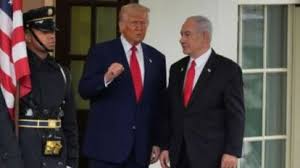Netanyahu to visit White House next week amid Trump’s call for ceasefire in Gaza

Washington, D.C., July 1, 2025 — Israeli Prime Minister Benjamin Netanyahu will visit the White House on Monday, July 7, to meet with U.S. President Donald Trump. The leaders will discuss efforts to end the war in Gaza and secure the release of Israeli hostages held by Hamas.
This will be Netanyahu’s third trip to Washington since Trump’s return to office in January. Their talks aim to push forward a comprehensive ceasefire deal in Gaza, where months of conflict have left thousands dead and created a severe humanitarian crisis.
Trump Intensifies Ceasefire Efforts
President Trump recently shifted focus from Iran to the conflict in Gaza. He believes that a breakthrough may come soon.
“We believe within the next week we’re going to see real movement toward a ceasefire and the return of hostages,” Trump said at Camp David.
The Trump administration is reviving a six-week truce plan first proposed under Biden. The new version includes phased military pauses, humanitarian aid, and negotiations for long-term stability. Trump’s team is also pushing both sides to release captives as part of the deal.
Hostage Crisis Pressures Both Sides
Roughly 50 hostages, including dual nationals and children, remain in Hamas custody after last year’s October attack. Hamas demands Israel withdraw forces and lift the blockade before it will free them. Israel refuses those conditions.
Trump hopes to broker a deal involving prisoner swaps and a temporary truce. U.S. officials say the hostage issue has become central to any path toward peace.
Netanyahu Faces Backlash at Home
Though Netanyahu supports talks with Washington, several members of his cabinet strongly oppose a ceasefire. Finance Minister Bezalel Smotrich and National Security Minister Itamar Ben-Gvir reject any deal that halts military operations or surrenders territory.
Despite that pushback, Netanyahu believes that meeting with Trump may help ease global criticism and buy political time.
Israeli Military Actions Continue
As diplomacy advances, the Israel Defense Forces (IDF) continue operations in Gaza. A recent airstrike on the Al-Nuseirat refugee camp killed more than 60 Palestinians, including women and children.
The IDF said it targeted a Hamas command post. But the strike caused outrage across the region. Human rights groups condemned the attack and demanded a ceasefire.
The U.N. warns of a worsening crisis. Over 18,000 Palestinians have died, and two-thirds of Gaza’s population are now displaced. Food, water, and medical aid remain scarce.
U.S. Sends Weapons While Seeking Peace
Last week, the Trump administration approved a $510 million arms deal with Israel. The package includes guided bombs and advanced drones. Officials say these weapons help limit civilian harm by improving precision.
Critics argue the sales contradict Trump’s push for peace. Rep. Ilhan Omar stated, “You can’t call for peace while arming one side.” The White House insists it’s balancing military support with pressure to end the war.
Trump Stands by Netanyahu
Trump also voiced strong support for Netanyahu’s legal battles. The Israeli Prime Minister faces ongoing corruption charges, which Trump compared to his own legal issues.
“Bibi is being unfairly targeted, just like I was,” Trump said. “We need strong leadership during a crisis, not distractions from the courts.”
Trump’s comments could help Netanyahu politically but have drawn criticism from legal experts and opposition leaders.
Global Leaders React
The European Union welcomed the planned meeting and urged both leaders to support a lasting peace. EU officials emphasized the need for Gaza’s reconstruction and renewed talks on a two-state solution.
Egypt and Qatar, who often mediate between Hamas and Israel, urged the U.S. not to sideline regional diplomacy. Meanwhile, Hamas released a statement calling the White House visit “a continuation of American bias.” Still, it expressed openness to “serious talks with reliable mediators.”
Final Thoughts
Netanyahu’s White House visit could mark a turning point. Trump is eager to show progress, while Netanyahu seeks to ease international criticism. Their success will depend on whether they can push both Israel and Hamas toward real compromise.
For hostages’ families and civilians trapped in Gaza, hopes are rising. But the path forward remains difficult, with diplomacy, politics, and conflict still deeply entangled.






